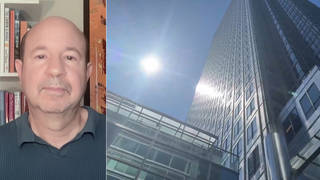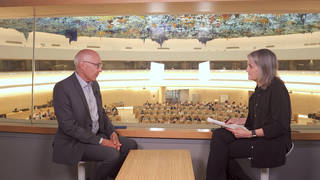This content originally appeared on Democracy Now! and was authored by Democracy Now!.
This post was originally published on Radio Free.
This content originally appeared on Democracy Now! and was authored by Democracy Now!.
This post was originally published on Radio Free.
This content originally appeared on Democracy Now! and was authored by Democracy Now!.
This post was originally published on Radio Free.
This content originally appeared on Democracy Now! and was authored by Democracy Now!.
This post was originally published on Radio Free.
This content originally appeared on Democracy Now! and was authored by Democracy Now!.
This post was originally published on Radio Free.
This content originally appeared on Democracy Now! and was authored by Democracy Now!.
This post was originally published on Radio Free.
This content originally appeared on Democracy Now! and was authored by Democracy Now!.
This post was originally published on Radio Free.

In an effort to fulfill the Trump administration’s daily immigration arrest “quotas,” federal agents and deputized local law enforcement are racially profiling and snatching people off the streets without due process. These arrests, carried out by armed and masked agents, are sowing terror and confusion in communities across the United States. Stephano Medina, a lawyer with the California Center for Movement Legal Services, shares how ICE regularly denies that it has taken people into custody, leading to family members scrambling for information about their loved ones. “It’s arrest now, ask questions later,” adds Dominique Boubion, an attorney representing Andrea Velez, a U.S. citizen who was taken by ICE last month in what Velez has since described as a “kidnapping.”
This content originally appeared on Democracy Now! and was authored by Democracy Now!.
This post was originally published on Radio Free.

In an effort to fulfill the Trump administration’s daily immigration arrest “quotas,” federal agents and deputized local law enforcement are racially profiling and snatching people off the streets without due process. These arrests, carried out by armed and masked agents, are sowing terror and confusion in communities across the United States. Stephano Medina, a lawyer with the California Center for Movement Legal Services, shares how ICE regularly denies that it has taken people into custody, leading to family members scrambling for information about their loved ones. “It’s arrest now, ask questions later,” adds Dominique Boubion, an attorney representing Andrea Velez, a U.S. citizen who was taken by ICE last month in what Velez has since described as a “kidnapping.”
This content originally appeared on Democracy Now! and was authored by Democracy Now!.
This post was originally published on Radio Free.

Deep in the Florida Everglades, at an abandoned airfield surrounded by barren swampland, local law enforcement authorities are opening the doors to a huge tent facility that hopes to lock up immigrants swept up in the Trump administration’s mass deportation machine. Republicans have branded the still-unapproved facility “Alligator Alcatraz,” with Florida Attorney General James Uthmeier boasting that the state can afford to keep staff and safety costs low because the wild animals of the swamp will provide security and prevent escapes. Immigrant rights advocates warn that the cramped facility will further isolate immigrants who are being rounded up indiscriminately and detained without charge, and could lead to life-threatening overheating and overcrowding. We speak to Nery Lopez of Detention Watch Network and Aaron Reichlin-Melnick of the American Immigration Council for more about the “inhumane” proposed detention camp.
This content originally appeared on Democracy Now! and was authored by Democracy Now!.
This post was originally published on Radio Free.

Deep in the Florida Everglades, at an abandoned airfield surrounded by barren swampland, local law enforcement authorities are opening the doors to a huge tent facility that hopes to lock up immigrants swept up in the Trump administration’s mass deportation machine. Republicans have branded the still-unapproved facility “Alligator Alcatraz,” with Florida Attorney General James Uthmeier boasting that the state can afford to keep staff and safety costs low because the wild animals of the swamp will provide security and prevent escapes. Immigrant rights advocates warn that the cramped facility will further isolate immigrants who are being rounded up indiscriminately and detained without charge, and could lead to life-threatening overheating and overcrowding. We speak to Nery Lopez of Detention Watch Network and Aaron Reichlin-Melnick of the American Immigration Council for more about the “inhumane” proposed detention camp.
This content originally appeared on Democracy Now! and was authored by Democracy Now!.
This post was originally published on Radio Free.

The budget bill just passed by the Senate provides more than $170 billion in new funding for immigration enforcement and detention. Aaron Reichlin-Melnick, who worked on an analysis published by the American Immigration Council, says the new budget would make ICE “the single largest federal law enforcement agency in the history of the nation.”
This content originally appeared on Democracy Now! and was authored by Democracy Now!.
This post was originally published on Radio Free.

The budget bill just passed by the Senate provides more than $170 billion in new funding for immigration enforcement and detention. Aaron Reichlin-Melnick, who worked on an analysis published by the American Immigration Council, says the new budget would make ICE “the single largest federal law enforcement agency in the history of the nation.”
This content originally appeared on Democracy Now! and was authored by Democracy Now!.
This post was originally published on Radio Free.

After a contentious round of last-minute negotiations, President Trump’s budget bill has passed in the Senate, squeaking by thanks to Vice President JD Vance casting the tie-breaking vote. Three Republicans joined Senate Democrats in voting “no” on the bill, which gives tax cuts to the rich and makes historic cuts to Medicaid and food assistance. The bill now heads to the House of Representatives, where Republicans hold a slim majority, for a final vote before Trump’s July 4 deadline. Citizen groups, including the grassroots political organization Indivisible, are calling on Americans, particularly those living in Republican and swing districts, to contact their House representatives and urge them to vote against the bill. “It’s not a done deal,” says Indivisible’s co-founder and co-executive director Ezra Levin. “They do not have the votes.”
This content originally appeared on Democracy Now! and was authored by Democracy Now!.
This post was originally published on Radio Free.
Democracy Now! Wednesday, July 2, 2025
This content originally appeared on Democracy Now! Audio and was authored by Democracy Now!.
This post was originally published on Radio Free.
This content originally appeared on Democracy Now! and was authored by Democracy Now!.
This post was originally published on Radio Free.
This content originally appeared on Democracy Now! for Broadcasters – HD MP4 and was authored by Democracy Now! for Broadcasters – HD MP4.
This post was originally published on Radio Free.
This content originally appeared on Democracy Now! and was authored by Democracy Now!.
This post was originally published on Radio Free.
This content originally appeared on Democracy Now! and was authored by Democracy Now!.
This post was originally published on Radio Free.
This content originally appeared on Democracy Now! and was authored by Democracy Now!.
This post was originally published on Radio Free.
This content originally appeared on Democracy Now! and was authored by Democracy Now!.
This post was originally published on Radio Free.
This content originally appeared on Democracy Now! and was authored by Democracy Now!.
This post was originally published on Radio Free.
This content originally appeared on Democracy Now! and was authored by Democracy Now!.
This post was originally published on Radio Free.

A heat wave is raising temperatures to dangerous levels across much of Europe, just days after a heat wave in North America saw over 3,000 temperature records set. For more, we speak with climate scientist Michael Mann, who warns that heat domes and flooding have nearly tripled since the 1950s. “At some level, this isn’t that complicated. You make the planet hotter, you’re going to have more frequent and intense heat extremes,” says Mann, a professor of environmental science at the University of Pennsylvania. Mann’s upcoming book, co-authored with vaccine expert Dr. Peter Hotez, is Science Under Siege: How to Fight the Five Most Powerful Forces That Threaten Our World.
This content originally appeared on Democracy Now! and was authored by Democracy Now!.
This post was originally published on Radio Free.

“There are many things that happened in this war that are clearly war crimes,” Volker Türk, the United Nations high commissioner for human rights, says about Israel’s war on Gaza. Democracy Now!'s Amy Goodman spoke with the top U.N. rights watchdog in Geneva this week at the headquarters of the United Nations Human Rights Council. Türk, who has characterized Israel's actions in Gaza as ethnic cleansing, discusses the ongoing suffering of the civilian population, how Israel has attacked the U.N. and its workers, and why he continues to hope “for both Israelis and Palestinians to live side by side in peace.”
This content originally appeared on Democracy Now! and was authored by Democracy Now!.
This post was originally published on Radio Free.

We speak with American neurosurgeon Dr. Abdul Basit Khan in Gaza, where he is volunteering at the Nasser Hospital. He describes treating patients with blast injuries and gunshot wounds from Israeli attacks, all while coping with a lack of basic medical supplies and widespread hunger. “Food insecurity is rampant, from all levels of society. Even the physicians are not eating,” he says. Multiple blasts were heard during the interview, with Dr. Khan describing his patients as people “living in tents being indiscriminately bombed” by Israeli forces. “This is the worst thing I’ve ever seen in my entire life, by far.”
This content originally appeared on Democracy Now! and was authored by Democracy Now!.
This post was originally published on Radio Free.
Democracy Now! Tuesday, July 1, 2025
This content originally appeared on Democracy Now! Audio and was authored by Democracy Now!.
This post was originally published on Radio Free.
This content originally appeared on Democracy Now! and was authored by Democracy Now!.
This post was originally published on Radio Free.